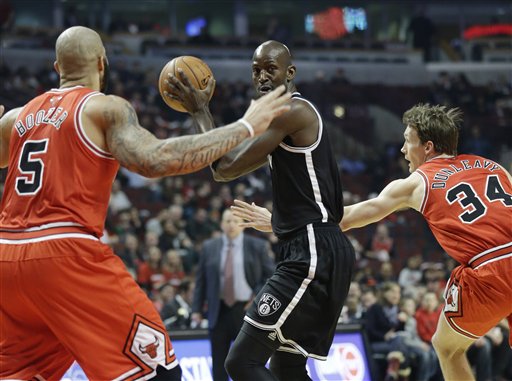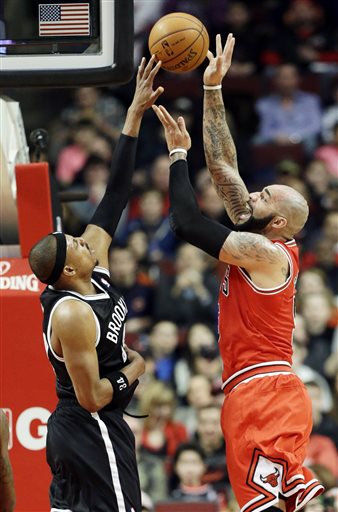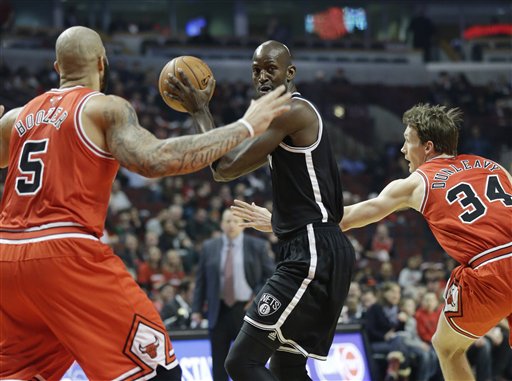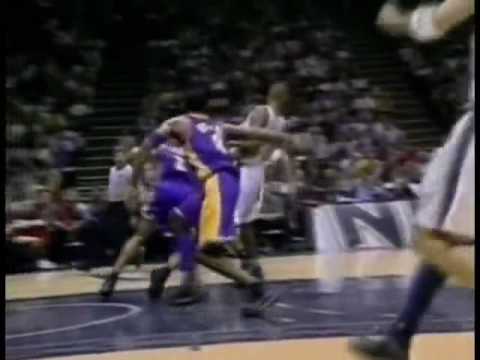
The deadline has passed, and the Brooklyn Nets still have a big problem.
The Nets only made one move at the trade deadline, acquiring guard Marcus Thornton from the Sacramento Kings for the rights to Reggie Evans and Jason Terry. He’s a decent scorer and three-point shooter (this season notwithstanding), but didn’t fill a significant need; the Nets are already a good three-point shooting team, with five regular three-point shooting threats in Alan Anderson, Joe Johnson, Paul Pierce, Mirza Teletovic, and Deron Williams.
Their issues are interior. They rank 27th out of 30 NBA teams in the NBA in total rebounding percentage and 18th in points allowed per 100 possessions. Though their defense has notably improved in the new year, their rebounding has actually gotten worse.
But despite that need, the Nets weren’t able to swing a deal for a big man worth doing by the Thursday 3 P.M. deadline.
“There are things we maybe could’ve done, but we decided not to do them because they weren’t the right fit for us,” Nets general manager Billy King confirmed.
The Nets currently start a hybrid lineup with the 6’7″ Paul Pierce at power forward, Kevin Garnett at center, and two point guards (Williams and Shaun Livingston) in the starting lineup. The lineup has paid dividends as one of the most efficient lineups in the NBA in 2014, but it hasn’t solved the team’s rebounding issues.
“It’s not always the big guys that have got to get the rebounding going,” King continued. “I was looking at the box score for Indiana (Wednesday) night, and (forward) Paul George gets 11, and (guard Lance) Stephenson gets 10. (Center Roy) Hibbert gets (5). So it’s not just the bigs. Rebounding’s got to become a game rebounding thing with us, no matter who we have. We need our guards to fall back, they did (Wednesday) night. First quarter, we didn’t rebound well, but I thought our guards and our key wing players were able to get some key rebounds. Paul did it, Joe grabbed one on the weak side.
“So it can’t just be, ‘we’re going to go at it big’ and then the bigs do the rebounding. We need everybody to rebound the basketball. Miami’s not the greatest rebounding team, but they do it as a game rebounding team.”
King wouldn’t comment directly on the talks with the Los Angeles Lakers about Jordan Hill, who the Nets reportedly considered absorbing into their Disabled Player Exception. Hill, 26-year-old 6’10” forward, has averaged 12.8 rebounds per 36 minutes in limited time in Los Angeles, more than any current Nets player. But he would’ve come at a steep price: with the Nets deep in the luxury tax, trading for Hill would’ve cost Nets owner Mikhail Prokhorov an additional $17 million.

Nets coach Jason Kidd, who is consulting with Billy King on another big, also said on WFAN radio that Garnett’s workload would not increase in the playoffs, increasing the demand for another big. (I wonder if he’s told Garnett yet.)
Garnett has averaged just 21.3 minutes per game this season. He averaged 35 minutes per game in six games during last year’s playoffs.
Despite King’s mantra that the team has to become a complete rebounding team, that starts with the big men. King reiterated numerous times that the Nets were looking at “all” big men, whether they be in free agency, in the D-League, or coming over from overseas (King specifically cited China on more than one occasion).
The most high-profile name the Nets have looked at is 35-year-old free agent center Jason Collins, who famously came out at the end of last season as the first openly gay male athlete in the four major US professional sports. He has not played since coming out. The Nets worked him out over the All-Star break. “He’s in shape,” King said.
Collins played 38 games for the Boston Celtics and Washington Wizards in 2012-13, averaging 1.1 points, 1.6 rebounds, and 2.2 fouls in 10.1 minutes per game. Collins played six and a half years in New Jersey with the Nets, including a long stint with Jason Kidd, building a reputation as a tough interior defender and a “six fouls” guy, but was never a prolific rebounder. Though signing Collins would bridge a cultural barrier far bigger than sports, he wouldn’t fix their rebounding problems.
Therein lies the inherent big problem: the Nets are choosing from a limited pool of talent, littered with players who haven’t been able to sign a full NBA contract for an entire year. Unless they’re able to claim a surprise player that gets bought out by his team and clears waivers, they’ll have few options for impact players.


















